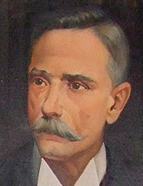

HGB ’ s medieval posterity quickly made his work indispensable in fields as diverse as property rights, social groups and political and legal institutions. In this respect, we must first highlight the influence exerted on Law Schools and on Legal Historiography in the process of renewal from the dawn of our century (Guilherme Moreira [1861-1922], Marnoco e Sousa [1860-1916], Joaquim Pedro Martins [1875-1939] and above all Paulo Merêa [1889-1977], Luís Cabral de Moncada [1888-1974] and, later, Marcello Caetano [1906-1980]). And then there was the reception by a historiographical community that in the 1940s-50s was beginning its long (and sometimes painful) process of institutionalising itself as a university: It was the ‘Coimbra School’ that collected HGB ’ s library and estate, and it was one of its members (Torquato de Sousa Soares [1903-1988]) who proceeded, from 1945 to 1954, to re-edit the work, which was by then commonly used (unfortunately, the promised tables of contents were never printed; in this respect , we are reduced to the attempt made by Augusto Reis Machado in the 1930s on the original edition).
The medievalists at the dawn of the 21 st century continue to have HGB as an unavoidable reference. The approach to any medieval subject almost presupposes, as a ‘reflex act’, a look at the História da Administração Publica [History of Public Administration] in order to find out what the author wrote and commented (or did not write or comment) on the subject. Through word or silence , HGB is therefore present in the work of today ’ s researcher, not as ‘our Bible’ (an expression that oral tradition attributes to Virgínia Rau [1907-1973]), but as a kind of ‘older colleague’, unforgettable among the representatives of the academic medievalism that finally took shape in our historiography at the end of the 1970s.
‘ Le véritable patriotisme (…) c’est le respect pour les générations qui nous ont précédés’ [True Patriotism (…) is respect for the generations that came before us] (Fustel de Coulanges, quoted by HG)
This work is financed by national funds through FCT - Foundation for Science and Technology, I.P, in the scope of the projects UIDB/04311/2020 and UIDP/04311/2020.
